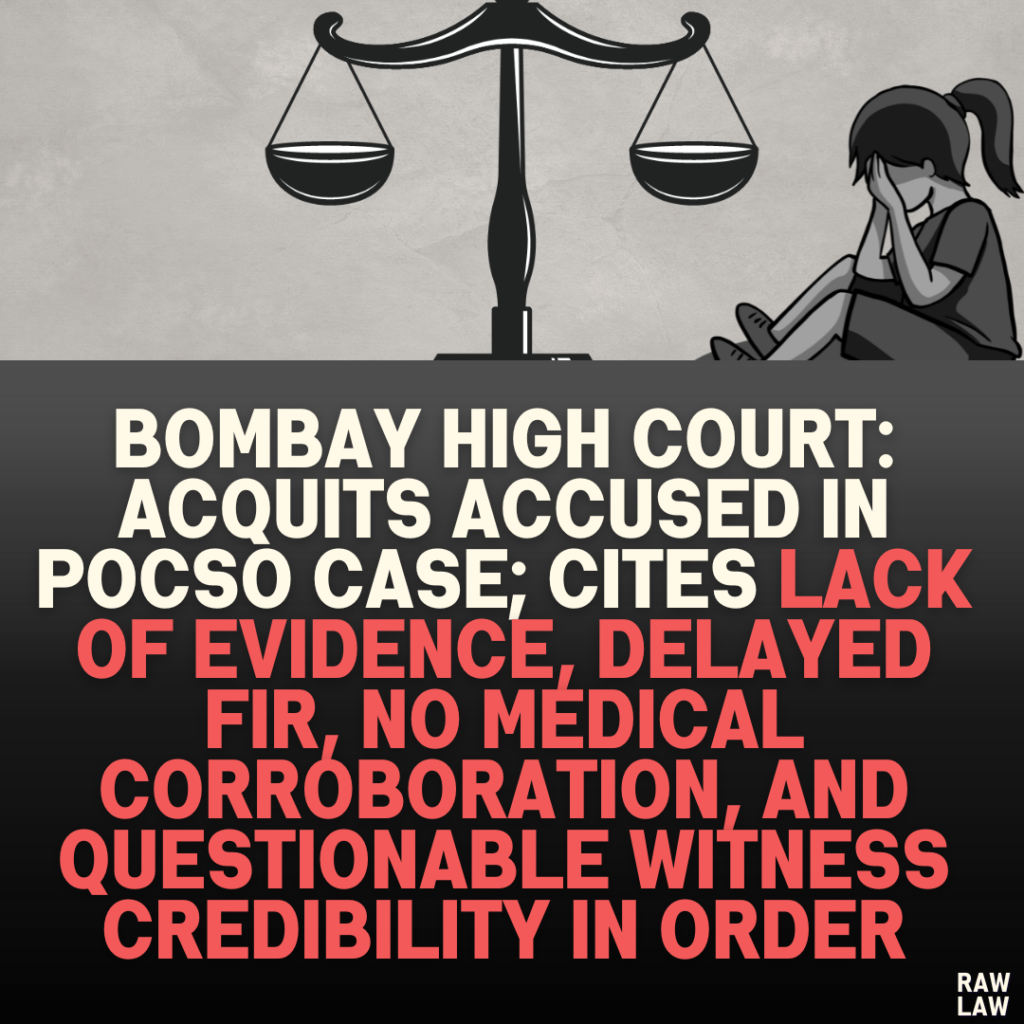Court’s Decision:
The Bombay High Court quashed the appellant’s conviction by the trial court under Section 376(2)(l) of the IPC and various sections of the POCSO Act. The court held that:
- The prosecution failed to provide sufficient evidence to establish the foundational facts of the case.
- The appellant was entitled to the benefit of doubt due to significant inconsistencies, lack of medical corroboration, and questionable credibility of witness testimonies.
- The appellant was ordered to be released immediately if not involved in any other case.
Facts:
- Incident Background:
- The victim, a 17-year-old deaf and mute girl, was allegedly raped by the appellant on the night of April 18, 2018, near a cattle shed in the village.
- The victim’s father lodged an FIR only on April 21, 2018, citing mental shock and deliberation as reasons for the delay.
- Sequence of Events:
- During a wedding celebration in the village, the victim’s parents attended the function, leaving her alone sleeping outside their house.
- The victim communicated the alleged incident to her mother through gestures the following morning.
- The family reported the incident to the police after a gap of two days.
- Prosecution’s Evidence:
- The victim’s testimony, communicated through gestures and translated by a special teacher.
- Medical examination of both the victim and the appellant.
- Witness testimonies of the victim’s parents.
- Documentary evidence to establish the victim’s age.
Issues:
- Was the victim below 18 years of age, qualifying her as a “child” under the POCSO Act?
- Did the delay in lodging the FIR affect the credibility of the case?
- Could the presumption under Section 29 of the POCSO Act apply despite the prosecution’s failure to prove foundational facts?
- Did the lack of injuries or corroborative evidence undermine the prosecution’s case?
Petitioner’s Arguments:
- Victim’s Age Not Proven:
- The evidence to establish the victim’s age (birth certificate and school records) was inconsistent and unreliable.
- False Implication:
- Enmity between the appellant’s family and the victim’s family motivated the false allegation.
- No Medical Corroboration:
- The absence of injuries on the victim or the appellant contradicted the prosecution’s narrative of forcible sexual assault.
- Delay in FIR:
- The two-day delay in reporting the incident created room for deliberation and embellishment.
- Unreliable Testimonies:
- The parents’ and victim’s testimonies were inconsistent and failed to establish the alleged incident.
Respondent’s Arguments:
- Credibility of Victim’s Testimony:
- The victim’s testimony, communicated through gestures and supported by her parents, was credible and sufficient for conviction.
- Cultural and Social Stigma:
- Delay in FIR is common in cases of sexual assault due to fear of societal stigma and concerns for the victim’s future.
- Presumption under POCSO Act:
- The statutory presumption under Section 29 of the POCSO Act supported the prosecution’s case.
Analysis of the Law:
- Age Determination:
- The court found discrepancies in the evidence establishing the victim’s age.
- Testimonies and documents provided by the prosecution were inconsistent, and the victim’s age as under 18 was not proven beyond a reasonable doubt.
- Delay in FIR:
- The court referenced precedents that emphasize the need for prompt reporting in cases of sexual assault.
- It observed that the unexplained delay allowed for the possibility of concoction and embellishment.
- Medical Evidence:
- Medical examination of the victim revealed no injuries or signs of recent sexual assault.
- The court noted that the absence of injuries raised significant doubts about the prosecution’s narrative.
- Presumption under Section 29 of POCSO Act:
- The statutory presumption of guilt under Section 29 applies only when foundational facts are established.
- Since the prosecution failed to prove the foundational facts (age of the victim and occurrence of the incident), the presumption did not apply.
Precedent Analysis:
- Bharwada Bhoginbhai Hirjibhai v. State of Gujarat (1983):
- This precedent emphasized the improbability of false allegations of sexual assault in Indian society.
- The court distinguished this case, noting the lack of corroborative evidence and foundational facts here.
- Wahid Khan v. State of Madhya Pradesh (2010):
- The Supreme Court upheld a conviction despite lacunas in evidence.
- The High Court found this precedent inapplicable due to the significant inconsistencies and doubts in the present case.
Court’s Reasoning:
- Doubts Over Incident:
- The lack of injuries on both the victim and appellant contradicted claims of forcible sexual assault.
- The presence of numerous people near the scene and the victim’s proximity to her house made the prosecution’s narrative improbable.
- Victim’s Testimony:
- While the victim’s testimony is crucial, it lacked corroboration from other evidence and was inconsistent with circumstantial details.
- Delay and Credibility:
- The unexplained delay in filing the FIR weakened the prosecution’s case and raised questions about the credibility of the narrative.
- Fair Trial Principles:
- The court emphasized balancing the interests of the victim and the accused, ensuring a fair trial for both parties.
Conclusion:
The court allowed the appeal, acquitting the appellant and ordering his immediate release. It noted that the prosecution’s failure to establish foundational facts, coupled with inconsistencies and lack of corroboration, warranted giving the benefit of doubt to the appellant.
Implications:
- Standards of Proof:
- Reinforces the principle that convictions in sexual assault cases require strong, corroborative evidence, even under statutory presumptions.
- Balance of Interests:
- Highlights the need to protect victims while ensuring a fair trial for the accused.
- Procedural Gaps:
- Calls attention to the need for better investigative procedures, such as prompt recording of victim statements under Section 164 Cr.P.C.
This judgment sets a precedent for ensuring procedural and evidentiary rigor in cases involving severe allegations under the POCSO Act.
